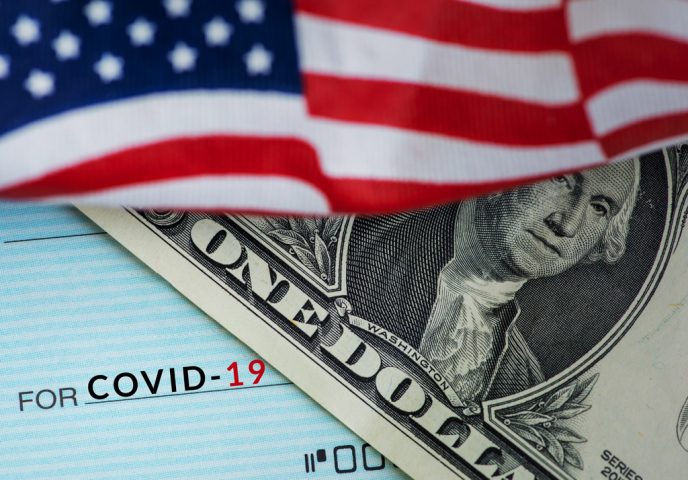Take Proper Care with Your COVID-19 Stimulus Payment

Interested in Veteran History? We’ve Got a Special Offer for You!
May 4, 2020
Spring 2020 PDF Newsletter
May 5, 2020As announced by the U.S. Treasury Department and IRS on April 17, Veterans and their family members will soon automatically receive COVID-19 stimulus payments from the federal government. This article is not about payment eligibility, but about what recipients can do to protect themselves and plan for the financial opportunities the stimulus check will provide.
Act now to protect your funds from identity thieves
Safety is always a factor when scammers know money will be transmitted electronically or through the mail. For identity theft protection, it is recommended that you place a security freeze on your credit reports. A credit freeze will lock down your credit report and prevent identity thieves from opening any new credit in your name. Because creditors/lenders must see your credit report before they open/approve a new account in your name, a security freeze will lock out an unknown applicant. Also, you can now check your credit report for free, weekly through April 21 at annualcreditreport.com. Freezing and checking your own credit report will not impact your credit score. If you choose to apply for credit, you can easily lift the security freeze. To understand the difference between credit monitoring and credit freeze, see www.consumer.ftc.gov/articles/0497- credit-freeze-faqs.
Avoid the scammers
There are multiple ways scammers can get their hands on your COVID-19 stimulus payouts and your Personal Identifiable Information (“PII”):
- They may contact you by phone, mail, text, email and social media and try to get your PII – Name, date of birth, Social Security Number, bank account information and/or government debit card account numbers.
- They may try to charge you a fee to get your stimulus check.
The Federal Trade Commission provides the following four tips to avoid being victimized by COVID-19 stimulus scammers:
- Only use irs.gov/COVID-19 to submit information to the IRS – and never respond to a call, text or email.
- The IRS won’t contact you by phone, email, text message or social media with information about your stimulus payment, or to ask you for your Social Security number, bank account or government benefits debit card account number. Anyone who does is a scammer phishing for your information.
- You don’t have to pay to get your stimulus money.
- The IRS won’t tell you to deposit your stimulus check then send them money back because they paid you more than they owed you. That’s a fake check scam.
Report scams to the Federal Trade Commission at ftc.gov/complaint. Sign up for the FTC’s consumer alerts.
Get the most out of every dollar
As a Veteran, after you have armed yourself with knowledge and security, ask yourself how the stimulus check can work for you?
Here are possible suggestions if you have qualified for the stimulus check of $1,200, $2,400 and additional $500 dependent benefits:
- Pay your monthly bills – Budget the stimulus check and attempt to remain current on your monthly bills (rent/mortgage, food, utilities, and vehicle), if possible, especially if your employer has reduced your hours or you have lost your job due to COVID-19. Contact your creditors if you can’t make your payments due to COVID-19.
- Lower your debt – This may be an opportunity for you to pay off or pay down debt. Consider using all or part of your stimulus to pay against debt, beginning with the highest interest rate.
- Emergency savings – Start or increase your emergency savings account for possible unforeseen circumstances in the future.
- By paying down debt and having a savings, you may qualify for a lower interest balance transfer opportunity. However, before applying for this opportunity, make sure your budget can meet the terms of the transferred debt to a new lower interest account. Also, make sure you understand the terms if you cannot meet the original terms and conditions, for example (1) know all the effects this will have on your interest rate (will it increase and exactly what the rate will be?), (2) all penalties and (3) the financial consequences should you need to add purchases/debts to this account, etc.
- If you do not have debt, maximizing savings interest is an opportunity worth researching. You may wish to consider higher yield opportunities for savings – a money market, CD, IRA, annuity, etc. A personal banker at your financial institution can provide you with the details of the products they offer and you can compare their products with other financial institutions as well.
- This may be a time for you consider the future to include life insurance, children’s education, donations, etc.
- If you are financially stable, have savings and are debt free – ask yourself how you can enrich your life and have some fun!
These are only some of the possibilities to consider. If you have any questions or would like to meet with personal financial consultant, Lori Mann, please call (330) 564-8030 for an appointment.



